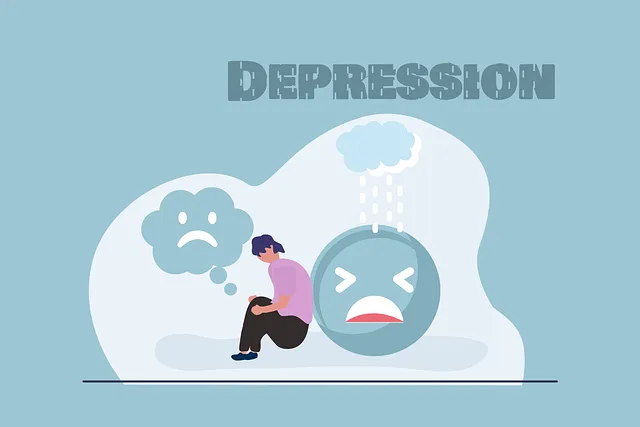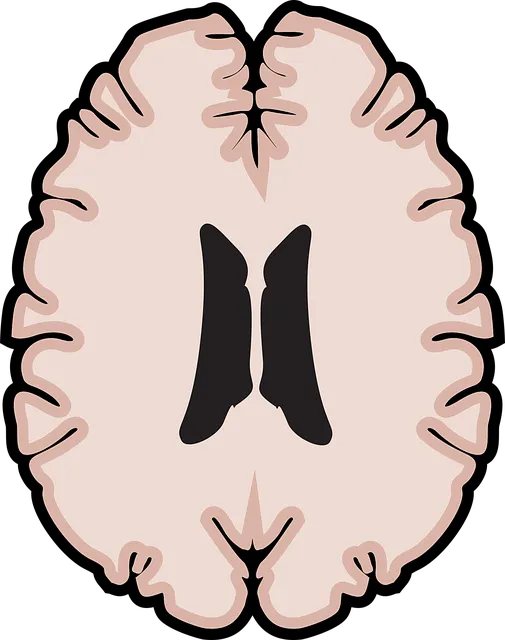Healthcare provider burnout is a critical issue exacerbated by high stress, demanding work, and heavy workloads. Organizations like Golden Kaiser Permanente address this through multi-faceted strategies. They offer accessible mental health support via the Golden Kaiser Permanente mental health number, encourage open dialogue about mental health challenges, and promote self-care through exercises like Mental Wellness Coaching Programs, Self-Awareness Exercises, Mindfulness Meditation, and Emotional Regulation techniques. Creating a supportive work environment with policies promoting work-life balance, equitable workload distribution, and confidential counseling services further prevents burnout. Integrating mental health education focusing on self-care, mindfulness, positive thinking, and support networks, along with community outreach programs, fosters resilience. Maintaining healthy boundaries between work and personal life through self-care practices like exercise, adequate sleep, and social connections is crucial for long-term passion and dedication among healthcare providers.
Healthcare provider burnout is a growing concern, impacting patient care and organizational stability. This article explores comprehensive strategies to prevent burnout among healthcare professionals. We delve into the root causes, such as heavy workloads and lack of support, highlighting the significant effects on both providers and patients. Key resources like Golden Kaiser Permanente’s mental health services are examined, along with evidence-based practices fostering resilience. Self-care and work-life balance emerge as vital tools to combat burnout, offering a path towards sustainable healthcare delivery. Remember that recognizing and addressing burnout is essential for a healthy and resilient healthcare workforce. Contact the Golden Kaiser Permanente mental health number for professional support when needed.
- Understanding Burnout Among Healthcare Providers: Causes and Impact
- Golden Kaiser Permanente Mental Health Support: A Key Resource
- Creating a Supportive Work Environment to Prevent Burnout
- Evidence-Based Strategies for Enhancing Resilience in Healthcare Workers
- The Role of Self-Care and Work-Life Balance in Burnout Prevention
Understanding Burnout Among Healthcare Providers: Causes and Impact

Burnout among healthcare providers is a growing concern, with high stress levels and demanding work environments contributing to physical and emotional exhaustion. This phenomenon is not just a personal struggle but has significant implications for patient care and the overall healthcare system. Healthcare professionals, often on the frontlines of patient interaction, face unique challenges that can lead to burnout over time.
The causes are multifaceted, including heavy workload, long hours, lack of control over work processes, emotional demands, and a constant need to stay updated with medical advancements. These factors can erode their mental health and overall well-being, impacting not just the individual but also the quality of patient interactions. The Golden Kaiser Permanente mental health number serves as a crucial resource for professionals seeking support, yet preventing burnout requires a comprehensive approach involving Mental Wellness Coaching Programs that focus on development and emotional intelligence, alongside Self-Awareness Exercises to strengthen resilience.
Golden Kaiser Permanente Mental Health Support: A Key Resource

At Golden Kaiser Permanente, mental health support is a key resource for healthcare providers navigating the demanding landscape of patient care. The organization prioritizes the well-being of its workforce through various initiatives, including accessible counseling services and comprehensive psychological resources. By offering a dedicated mental health number, Kaiser Permanente ensures that providers can easily connect with professional support when facing burnout or stress.
Effective communication strategies play a pivotal role in this process. Encouraging open dialogue between staff members fosters a culture where discussing mental health challenges is normalized. Additionally, Mental Wellness Journaling Exercises guidance provides practitioners with tools to reflect on their experiences and promote self-care. Public Awareness Campaigns Development further contributes to raising awareness about burnout prevention, encouraging both providers and the public to prioritize mental wellness.
Creating a Supportive Work Environment to Prevent Burnout

Creating a supportive work environment is a robust strategy to prevent burnout among healthcare providers. Organizations like Golden Kaiser Permanente recognize this and prioritize fostering a culture that nurtures well-being. This involves implementing policies that encourage work-life balance, such as flexible schedules and reasonable workload distribution. Additionally, providing access to mental health resources, including confidential counseling services and employee assistance programs, ensures that staff members have the necessary tools to manage stress and maintain emotional resilience.
Integrating practices like Mindfulness Meditation and Emotional Regulation techniques into daily routines can significantly enhance healthcare providers’ ability to cope with high-pressure situations. Encouraging open discussions around Emotional Intelligence fosters a supportive atmosphere where colleagues can understand and support each other’s well-being. These initiatives collectively contribute to creating an environment that values and prioritizes the mental health of its workforce, ultimately preventing burnout.
Evidence-Based Strategies for Enhancing Resilience in Healthcare Workers

Healthcare worker burnout is a growing concern, but evidence-based strategies can enhance resilience and prevent emotional exhaustion. One effective approach involves integrating mental health education programs designed to promote coping skills and stress management techniques. These programs, inspired by organizations like Golden Kaiser Permanente, emphasize the importance of self-care and mental well-being. By incorporating mindfulness exercises, positive thinking practices, and support networks, healthcare workers can build resilience against workplace challenges.
Community outreach program implementation is another strategy that fosters a sense of belonging and purpose. Engaging in community activities related to mental health awareness and education can provide a much-needed break from the demands of clinical settings. These initiatives not only improve individual well-being but also contribute to creating a supportive network, enhancing the overall resilience of healthcare workers. Positive thinking, when encouraged through structured programs, can help professionals navigate the emotional toll of their work more effectively.
The Role of Self-Care and Work-Life Balance in Burnout Prevention

Maintaining a healthy work-life balance is an integral part of burnout prevention for healthcare providers. It involves recognizing the importance of self-care and prioritizing personal well-being alongside professional responsibilities. This doesn’t mean one should neglect their job; instead, it’s about finding equilibrium to avoid mental exhaustion. Healthcare workers can achieve this by setting clear boundaries between work and personal time, ensuring they engage in activities that bring joy and relaxation outside of work hours, and practicing effective stress management techniques.
Self-care practices such as regular exercise, mindfulness meditation, adequate sleep, and nurturing social connections can significantly contribute to preventing burnout. Additionally, seeking support from peers, mentors, or professional counseling services like the Golden Kaiser Permanente mental health number can provide crisis intervention guidance and facilitate self-esteem improvement. Prioritizing these aspects of well-being empowers healthcare providers to maintain their passion, resilience, and dedication in the long term.
Healthcare provider burnout is a growing concern, but with the right strategies, it can be effectively prevented. By understanding the causes and impact of burnout, utilizing resources like the Golden Kaiser Permanente mental health support system, fostering supportive work environments, adopting evidence-based resilience enhancement techniques, and prioritizing self-care and work-life balance, healthcare organizations can create a sustainable and healthy workforce. Remember, addressing burnout not only benefits individual providers but also improves patient care and organizational success.






